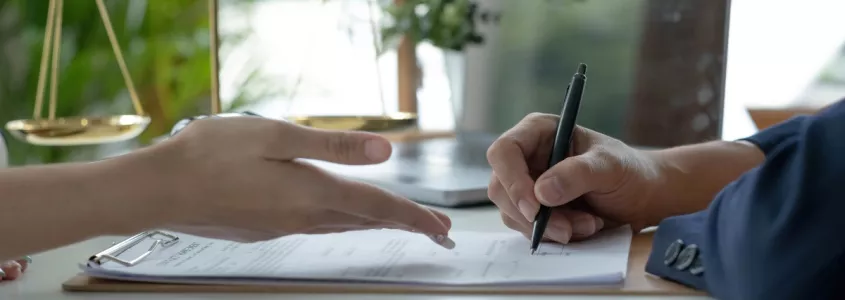
Table of contents
There are times when, for whatever reason, we need to delegate the power to act on our behalf to another person. For this purpose, in the case of legal transactions, it is necessary to grant a power of attorney. But what exactly is this document and what types are there? These two questions and many more will be answered here.
What is a power of attorney?
Powers of attorney are public documents that enable natural and legal persons to appoint another person to act on their behalf in certain legal transactions.
The person who is represented is called the principal, while the representative is called the attorney-in-fact. The power of attorney must always be authorised by a notary in the exercise of his office.
What are the requirements for the issue of a power of attorney?
Generally speaking, the legal requirements for the drawing up of powers of attorney are very low. Specifically, we are talking about the following:
- The principal must be over 18 years of age and of sound mind.
- The attorney-in-fact must meet the same requirements as the principal in terms of age and mental condition.
- The proxy must provide the notary with an identity document (DNI, NIE or passport). In the case of a legal entity, i.e. a company, the documents proving its incorporation must be provided.
How to make a power of attorney to authorise another person?
It is very simple. First of all, you have to go to a notary public and express your wish to execute a power of attorney. Afterwards, you must provide the notary with the aforementioned documentation, after which he or she will draw up the public deed.
Finally, the notary will give a copy of the document to the principal. He will then give it to the attorney-in-fact so that he can act on his behalf in the proceedings he deems appropriate.
The price of powers of attorney varies depending on the content and the amount of power of attorney assigned to the attorney-in-fact. Generally, their value ranges between 45 and 60 euros for the simplest (a power of attorney to sign a deed or similar document) and between 120 and 150 euros for the most complex (general powers of attorney).
What types of powers of attorney are there?
At present, it is possible to distinguish between three types of power of attorney. Let us take a look at them
General power of attorney
This is characterised by the fact that it gives the attorney-in-fact powers of representation to carry out all kinds of legal acts. In some cases, they even allow for actions on the assets. This is the power of attorney to sign a deed that is required during the process of buying and selling a property, for example.
Within this category, however, it is possible to find two sub-types:
- Power of attorney for litigation. The principal gives power of attorney to a solicitor or lawyer to act on his behalf. The aim? So that the litigation procedures can be carried out more quickly and securely.
- Power of attorney for the administration of assets. In this case, the attorney-in-fact may manage the assets of the principal. However, acts of disposition are excluded, such as taking out a mortgage or signing a purchase contract.
Special power of attorney
This type of power of attorney empowers the attorney-in-fact to carry out a single legal transaction. We are talking, for example, about the purchase and sale of a property, the processing of a divorce or inheritance, etc. There is a special type of power of attorney for each legal act for which representation is permitted. For example, it cannot be issued to execute a will.
Power of attorney
Many people are afraid that their wishes will not be honoured if the time comes when they are unable to express them. After all, life expectancy has increased considerably in recent years and we are increasingly aware of what a disability or serious illness can mean in old age.
Powers of attorney of this kind are intended to ensure that these wishes are fulfilled. To this end, the principal appoints a proxy who, when he or she is no longer able to express his or her wishes, is responsible for expressing them and making them effective on his or her behalf. It becomes effective once it is ascertained that there is a disability on the part of the person granting the power of attorney.
It should be noted that, when it refers to certain areas, the preventive power of attorney has to fulfil a number of additional requirements:
- Advance directives. It must always be made in the presence of witnesses who are of legal age, of sound mind and capable of acting.
- Self-guardianship. The guardian appointed by means of a power of attorney must be ratified by a judge after proving that he or she is not for profit.
In recent years, the number of powers of attorney has increased sixfold. These are usually powers of attorney from parents to children, but there are times when someone who is not a family member is appointed as a proxy.
Is it possible to revoke a power of attorney?
Of course it is. Any power of attorney can be revoked at the very moment when the principal expresses his/her wish to do so. You only have to go to a notary (it does not have to be the same one who issued it), ask him/her to do so and pay the relevant fees.
Can a joint power of attorney be issued?
Yes, for example, it is possible to ask a notary to issue a power of attorney for several siblings to appoint an attorney-in-fact to act on behalf of all of them, for example, when handling their parents' inheritance.
In short, powers of attorney are public deeds of representation thanks to which a third party can carry out almost any legal act on our behalf. We hope it is clear to you what they are for and what types exist. However, if you have any further questions, please contact us and we will answer them.

"Anywhere in Spain"
With our online appointment system you will have immediate advice without the need for face-to-face visits or travel.
One of our lawyers specialized in your area of interest will contact you to formalize an appointment and make your consultation by video call.
